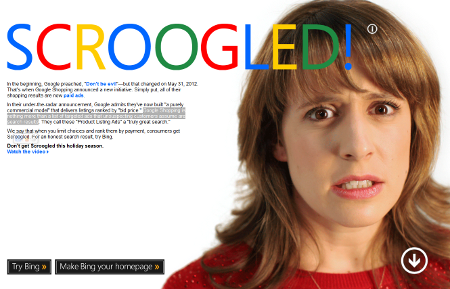Bing Revives Decade-Old Fight Over Paid Search Results
A little bit of Web history just repeated today, with the launch of a campaign by Microsoft to discredit Google for charging online stores to appear in shopping search results. The “Don’t Get Scroogled” campaign has strong echoes of battles fought amongst search engines such as AltaVista and AOL. The twist is that this time around is that Google – according to Microsoft – is on the other side of the fight.

Microsoft’s campaign site puts it like this:
“Google Shopping is nothing more than a list of targeted ads that unsuspecting customers assume are search results”
Back in 2002, the New York Times reported that the FTC wrote to many Web search companies to warn they must:
“[outline] the need for clear and conspicuous disclosures of paid placement, and in some instances paid inclusion, so that businesses may avoid possible future commission action.”
That letter went to AltaVista, AOL Time Warner, iWon.com, Looksmart, Terra Lycos, and Direct Hit. It also went to Microsoft, but it didn’t go to Google, which at the time took a strong position against any form of paid inclusion. It seems the pair have switched sides in the past decade.
Another big difference between this new round of the paid inclusion fight and the one before is that should the FTC decide it needs to warn search companies again, it won’t need so many stamps. There are fewer search engines now, and ComScore reported this month that Google and Bing between them have a 95 percent market share for U.S. searches. Google’s cut of that is 67 percent share of all U.S. searches.
Keep Reading
Most Popular
Large language models can do jaw-dropping things. But nobody knows exactly why.
And that's a problem. Figuring it out is one of the biggest scientific puzzles of our time and a crucial step towards controlling more powerful future models.
The problem with plug-in hybrids? Their drivers.
Plug-in hybrids are often sold as a transition to EVs, but new data from Europe shows we’re still underestimating the emissions they produce.
Google DeepMind’s new generative model makes Super Mario–like games from scratch
Genie learns how to control games by watching hours and hours of video. It could help train next-gen robots too.
How scientists traced a mysterious covid case back to six toilets
When wastewater surveillance turns into a hunt for a single infected individual, the ethics get tricky.
Stay connected
Get the latest updates from
MIT Technology Review
Discover special offers, top stories, upcoming events, and more.